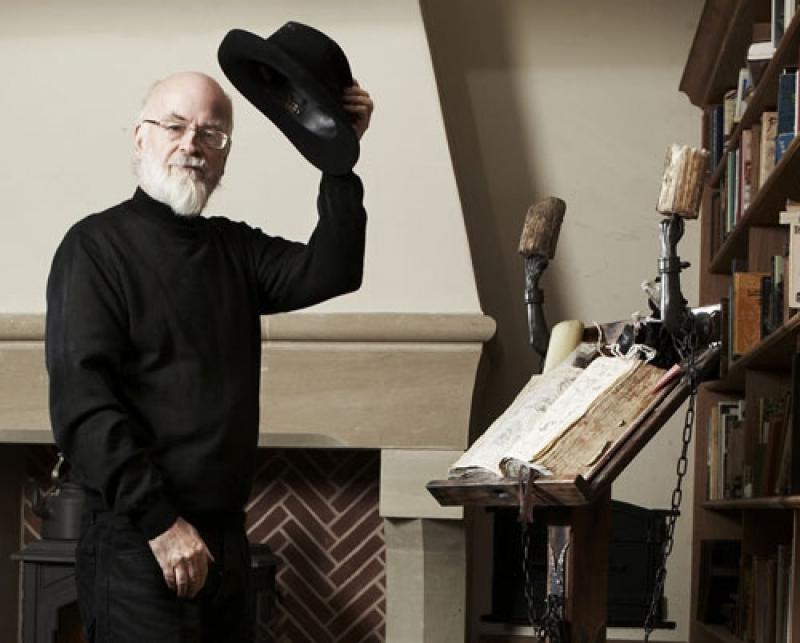Terry Pratchett: Choosing to Die, BBC Two | reviews, news & interviews
Terry Pratchett: Choosing to Die, BBC Two
Terry Pratchett: Choosing to Die, BBC Two
The novelist takes a logical approach to assisted suicide

The argument in Terry Pratchett's BBC Two documentary Choosing to Die boiled down to the sanctity of life versus the quality of life. Pratchett's own reasoning, that he has Alzheimer's disease and would prefer to choose the manner and timing of his own death before he becomes incapable of making that decision, is eminently logical.
The subjects of his film, multiple sclerosis sufferer Andrew Colgan and Peter Smedley, who has motor neuron disease, had opted to end their lives at the Dignitas clinic in Zurich rather than endure the inevitable progression of their illnesses. You might not have agreed with them, but they had reached their decisions after giving it lengthy and rational consideration. As Pratchett wondered rhetorically, "Who owns your life?"
But there was no getting around the creepiness of the Dignitas experience. Clients are taken to a nondescript blue house on an industrial estate, have a cup of tea in the carefully anonymous living room, and are then talked through the poison-taking experience by a couple of ingratiating elderly "escorts". The customers have paid £10,000 for the privilege and have been required to sign a sheaf of legal waivers.
ven Pratchett expressed his reservations about the process, while his wife and his assistant Rob Wilkins are both opposed to it. Peter Smedley's wife, though supportive of her husband's decision, admitted that she found the faintly Nazi overtones of the process difficult to put out of her mind. Apparently 20 per cent of Dignitas's clients want to die because they are merely suffering from "weariness of life".
Pratchett contends that assisted suicide for the terminally ill should be legal in the UK, but how that would be organised wasn't part of the discussion here. No doubt wealthier patients would be able to pay for a deluxe experience with champagne and roses, but could mercy killing really become part of the NHS's remit? The "slippery slope" argument, that once a government permits the killing of its own citizens there's no telling where it will end, is going to be a tough one to beat.
Explore topics
Share this article
more TV
 Blue Lights Series 2, BBC One review - still our best cop show despite a slacker structure
The engaging Belfast cops are less tightly focused this time around
Blue Lights Series 2, BBC One review - still our best cop show despite a slacker structure
The engaging Belfast cops are less tightly focused this time around
 Baby Reindeer, Netflix review - a misery memoir disturbingly presented
Richard Gadd's double traumas are a difficult watch but ultimately inspiring
Baby Reindeer, Netflix review - a misery memoir disturbingly presented
Richard Gadd's double traumas are a difficult watch but ultimately inspiring
 Anthracite, Netflix review - murderous mysteries in the French Alps
Who can unravel the ghastly secrets of the town of Lévionna?
Anthracite, Netflix review - murderous mysteries in the French Alps
Who can unravel the ghastly secrets of the town of Lévionna?
 Ripley, Netflix review - Highsmith's horribly fascinating sociopath adrift in a sea of noir
Its black and white cinematography is striking, but eventually wearying
Ripley, Netflix review - Highsmith's horribly fascinating sociopath adrift in a sea of noir
Its black and white cinematography is striking, but eventually wearying
 Scoop, Netflix review - revisiting a Right Royal nightmare
Gripping dramatisation of Newsnight's fateful Prince Andrew interview
Scoop, Netflix review - revisiting a Right Royal nightmare
Gripping dramatisation of Newsnight's fateful Prince Andrew interview
 RuPaul’s Drag Race UK vs the World Season 2, BBC Three review - fun, friendship and big talents
Worthy and lovable winners (no spoilers) as the best stay the course
RuPaul’s Drag Race UK vs the World Season 2, BBC Three review - fun, friendship and big talents
Worthy and lovable winners (no spoilers) as the best stay the course
 This Town, BBC One review - lurid melodrama in Eighties Brummieland
Steven Knight revisits his Midlands roots, with implausible consequences
This Town, BBC One review - lurid melodrama in Eighties Brummieland
Steven Knight revisits his Midlands roots, with implausible consequences
 Passenger, ITV review - who are they trying to kid?
Andrew Buchan's screenwriting debut leads us nowhere
Passenger, ITV review - who are they trying to kid?
Andrew Buchan's screenwriting debut leads us nowhere
 3 Body Problem, Netflix review - life, the universe and everything (and a bit more)
Mind-blowing adaptation of Liu Cixin's novel from the makers of 'Game of Thrones'
3 Body Problem, Netflix review - life, the universe and everything (and a bit more)
Mind-blowing adaptation of Liu Cixin's novel from the makers of 'Game of Thrones'
 Manhunt, Apple TV+ review - all the President's men
Tobias Menzies and Anthony Boyle go head to head in historical crime drama
Manhunt, Apple TV+ review - all the President's men
Tobias Menzies and Anthony Boyle go head to head in historical crime drama
 The Gentlemen, Netflix review - Guy Ritchie's further adventures in Geezerworld
Riotous assembly of toffs, gangsters, travellers, rogues and misfits
The Gentlemen, Netflix review - Guy Ritchie's further adventures in Geezerworld
Riotous assembly of toffs, gangsters, travellers, rogues and misfits
 Oscars 2024: politics aplenty but few surprises as 'Oppenheimer' dominates
Christopher Nolan biopic wins big in a ceremony defined by a pink-clad Ryan Gosling and Donald Trump seeing red
Oscars 2024: politics aplenty but few surprises as 'Oppenheimer' dominates
Christopher Nolan biopic wins big in a ceremony defined by a pink-clad Ryan Gosling and Donald Trump seeing red

Add comment